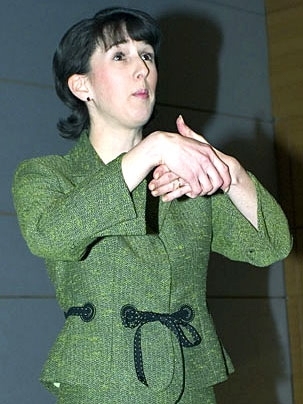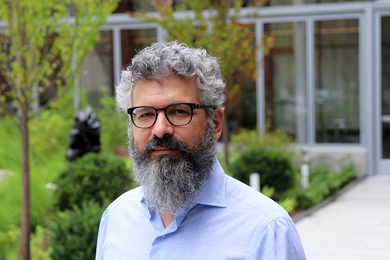A "mocktail party" -- an annual event sponsored by the School of Engineering's Undergraduate Practice Opportunities Program (UPOP) -- brought together more than 200 sophomores, 50 MIT alumni and friends and two deans in the Wang Auditorium on Tuesday, Feb. 28.
Currently in its fifth year, UPOP provides students with skills and experiences that expose them to the working world early in their academic careers.
Part of UPOP's Spring Professional Development Seminar Series, the "mocktail party" builds on UPOP students' intensive January "boot camp," which introduced them to the professional skills they'll need in the real world of engineering.
Early in the evening, Dean for Undergraduate Education Daniel Hastings emphasized the importance of business etiquette to effectiveness on the job, citing his own experience at the Pentagon in the late 1990s when he served as Air Force chief scientist.
Hastings introduced Jodi Smith of Mannersmith, an etiquette consulting firm, who offered tips on a such networking skills as how to shake hands successfully: Eye contact, palm-to-palm contact and making the correct judgment in how firmly to shake are all important, she said.
Later, students and alumni mingled over hors d'oeuvres and punch, getting a chance to practice what they had learned.
"Jodi teaches us that simple things done well really make you stand out," said Chris Resto, UPOP director (S.B. 1999). "Introducing yourself or shaking hands may seem very simple, but when you do it well, it can be the key to opening many opportunities."
Smith also offered polite conversation exits, a component many students particularly appreciated.
"It's amazing how there actually are concrete tips and tricks for how to initiate a conversation and keep it going smoothly, but also equally importantly, how to get away from it," said Katrine Sivertsen, a sophomore materials science and engineering major.
Smith stressed that rather than saying one is headed to the bathroom, bar or to a conversation with another person, it's preferable to say "it was a pleasure to meet you" and just move on. She also advised the participants to choose to eat or drink at a networking event "but never both," to keep a hand free for shaking.
Sophomore materials science and engineering major Mike Vasquez saw a direct link between the skills Smith taught and confident networking later in the evening.�� Smith had taught students to create a "tagline" for themselves, something to spark further conversation.
"I happened to use 'My name is Mike Vasquez and I'm a baseball nut,'" said Vasquez. "When I used it, it really helped me relax and ease into quite a few conversations with other students as well as a few of the industry professionals attending."
Vasquez added, "In my conversations with some of the employers, they kept reiterating how many of the topics Jodi talked about really set people apart in interviews, networking events, and even at work."
Many of the alumni attendees praised the event -- and UPOP in general -- as important to the future success of MIT's students.
"It (UPOP) helps complement the world-class engineering skills of MIT students with the social skills that will put them at ease in business and social settings and make them more effective," said Paul Edelman (Ph.D. 1978), managing director of Edelman and Associates, an executive search firm.
Associate Dean of Engineering Dick Yue presented a gift to Jerry Morris of the Shell Oil Co. in appreciation of Shell's sponsorship of the event.
This year, 259 students registered for UPOP -- about one-fourth of all MIT's sophomores and nearly 40 percent of those majoring in engineering.
A version of this article appeared in MIT Tech Talk on March 8, 2006 (download PDF).






